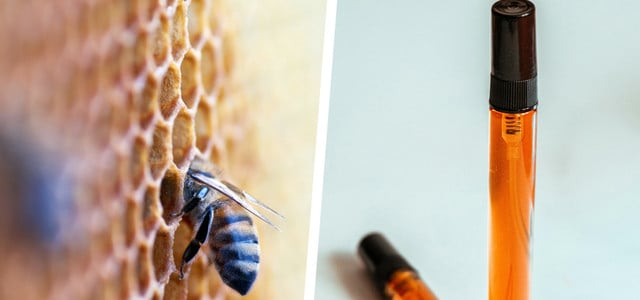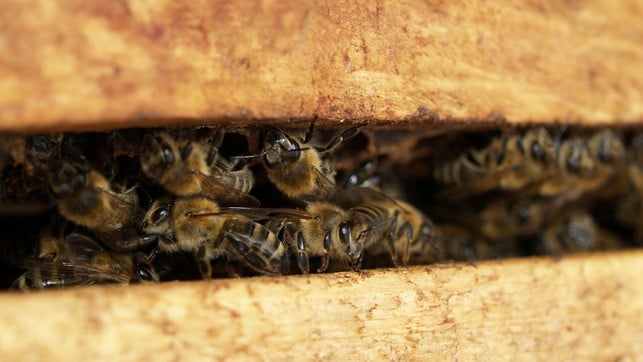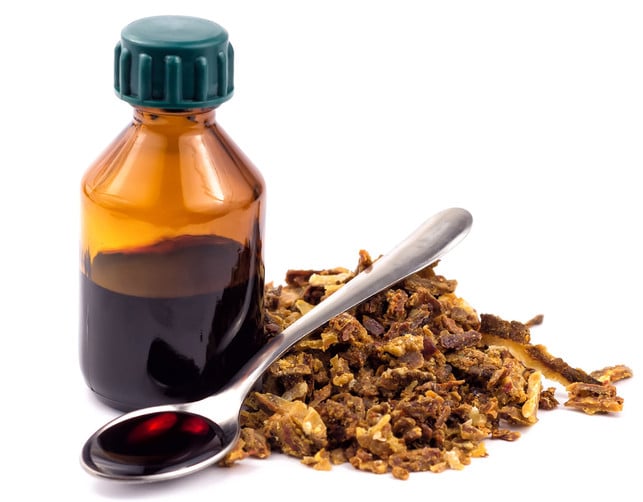
Propolis is a resinous substance that bees use as a building material. The home remedy is said to strengthen the immune system and help against inflammation. But: What effect does propolis actually have on humans? And what do you have to pay attention to when using it?
![]()
In the article:
- What is propolis?
- What effect does propolis have?
- The right application
- Allergies and side effects
- Buy propolis
What is propolis?
Propolis is also known as “bee resin” or “putty resin” and is a brownish, resinous substance. Bees produce propolis by combining resin from trees, their salivary secretions, pollen balm and essential oils from flowers.
On the one hand, the substance is used by bees as a building material to seal cracks and gaps, and on the other hand, it serves to prevent diseases and keep the colony healthy. Because: In a beehive there are high temperatures and high humidity, which promotes the spread of pathogens. Propolis has antifungal, antibacterial and antiviral effects and can therefore protect the bee colony from disease. The (alleged) effect of propolis on us humans is derived from these properties.
Depending on the size of the beehive and the surrounding trees, a beehive can produce up to half a kilo of bee resin per year. It has a distinctive smell and tastes bitter to spicy.
How is bee resin obtained?

In the hive, the bee resin is found in all cracks and crevices as well as at the entrance hole, so that the beekeeper only has to scrape off the resinous mass. However, this is laborious, produces little yield and can endanger the health of the bee colony.
As a rule, fine-meshed grids are placed in the hive for extraction, which the bees cover with the resin as foreign bodies. If you remove these grids again, you have to cool them below 15 degrees so that the bee resin flakes off. Beekeepers usually then dissolve the bee resin in alcohol and filter the resulting propolis tincture to remove foreign bodies such as wood fibers.
What effect does propolis have on humans?
Propolis is said to have many healing properties. But you shouldn’t believe all the promises: there is sometimes a lack of scientific evidence for the effect.
Propolis contains many flavonoids and phenols, i.e. secondary plant substances that are said to have antioxidant properties. The exact composition differs from region to region and depends on the plants growing around the hive. In total, up to 200 different substances have been detected so far.
Because of its antioxidant and germ-inhibiting properties, bee resin was already used in ancient Egypt to embalm mummies and was also a popular wound care agent in ancient times. Nowadays, propolis is used in various forms in natural medicine and as a home remedy:
- as a cosmetic (ointment, cream, spray)
- as a dietary supplement (capsules, powder, solution)
- as homeopathic medicines (tincture, also mother tincture, drops)
However: For often claimed effects such as strengthening the immune system or organ functions, there is still a lack of sufficient scientific research to prove these effects in humans. For this reason, there is currently not a single approved advertising claim for propolis in dietary supplements, as the consumer advice center reports.
Current research suggests that propolis could play a role in reducing various chronic diseases such as cardiovascular disease. However, further clinical studies on humans are necessary. In addition, standardization of the composition of the active substances would be necessary for medical use.
Application: Propolis as a tincture, ointment or drops
Propolis is used in many households to treat abrasions, sunburns, sore throats and inflammations, especially in the mouth and throat. Various remedies are available commercially, in particular alcoholic propolis tinctures, drops and lozenges as well as propolis ointments.
Bee resin is also often used in natural cosmetics, for example in facial creams for blemished skin or as a preservative with dual benefits.
Propolis tincture can be used directly to treat wounds and can also be used to make mouthwash or gargle solution. Propolis ointment is suitable for treating skin irritations, minor inflammations and promoting the healing of minor skin injuries. Lozenges or candies can provide relief from a sore throat or inflammation in the throat, such as tonsillitis. When buying, pay attention to how much of the substance is actually contained in the product!

Attention: Propolis dyes intensively, so products with the putty resin should not come into contact with textiles!
As described above, there is currently no proof of the effect of propolis for use as a dietary supplement. Health promises here partly refer to the other components of the products,
There are pet propolis products that claim to work as a dewormer for dogs and cats. Internet forums recommend mixing propolis tincture with food or administering it as tablets or coated tablets. However, there is no scientific proof of effectiveness. If you suspect a worm infestation, it is better to have your animal examined and treated by a veterinarian.
Allergy and side effects of bee resin
Attention: Not everyone can tolerate propolis! An estimated 4.2% of the population has an allergic reaction. Before using propolis for the first time, please try to see whether you may have an allergic reaction to it. The Federal Institute for Risk Assessment points out that people with asthma or a so-called “atopic predisposition” (skin and mucous membranes react sensitively to substances from the environment) have a higher risk of having an allergic reaction to propolis.
Anyone who is allergic to bee stings should be particularly careful with propolis.
Because bee resin consists of up to ten percent pollen, people with pollen allergies should also be careful. Anyone who tolerates one product without any problems can still react allergically to others. Depending on which plants grow near the producing bee colony, they may contain different pollen.
Where can you buy propolis?
Sales in Germany are regulated differently in every federal state. That’s why you may not be able to get it from beekeepers in your federal state, for example in Bavaria, but you can in other federal states.
Many beekeepers have their bees produce the resin on special grids and sell the purified end product either as a chewing gum-like substance or dissolved in alcohol as a tincture. Sometimes beekeepers also sell ointments and other natural remedies, but under German law they are not allowed to advertise these with health-promoting claims. Products containing propolis or active ingredients are sold in health food stores, some health food stores and also in pharmacies.
Buy: You can get the bee resin online from Bionaturel, Ecco Verde or Amazon as well as from specialized propolis shops such as Bedrop.
Utopia recommends
Propolis can be an addition to your home medicine cabinet. However, you should be aware that there is currently no sufficient scientific evidence of its effects on humans. You should be particularly skeptical about health claims made by dietary supplements.
You should note that propolis is a natural product that is not always available in the same composition because it partly depends on the location of the beehive. Propolis is therefore not vegan either. You should also be aware of the potential allergenic effects. If you want to use propolis products, we recommend that you pay attention to the origin and trustworthy manufacturers.
Read more on Techzle\.com:
- Bee pollen: What you need to know about the bee superfood
- Royal jelly: application, effects and possible dangers
- Raw honey: This is the difference from other varieties
** marked with ** or orange underlined Links to sources of supply are partly partner links: If you buy here, you are actively supporting Techzle\.com, because we then receive a small part of the sales proceeds. More info.